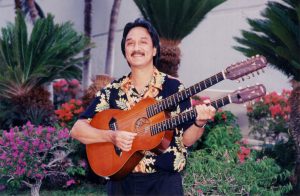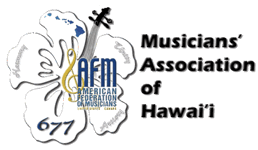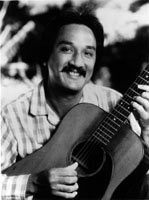 A longtime member of the Musicians’ Association of Hawai’i, George Kuo is an exquisite, but underrated, slack key guitarist whose reach extends far outside the islands. For those who’ve experienced him live, Kuo truly embodies the voice, or Ka Leo, of Hawaii.
A longtime member of the Musicians’ Association of Hawai’i, George Kuo is an exquisite, but underrated, slack key guitarist whose reach extends far outside the islands. For those who’ve experienced him live, Kuo truly embodies the voice, or Ka Leo, of Hawaii.
His exquisite voice and slack key touch, often on double-neck guitar, overflow with the true aloha spirit. Locals and visitors flock to his shows, whether they take place in Waikiki, the Hollywood Bowl, or a week-long music festival in Bordeaux, France.
A fierce advocate of traditional Hawaiian slack key, based on the nahenahe, or gentle, soothing style, Kuo plays what he feels, and he feels deeply. As gentle as a summer tradewind and full of aloha, his music — and voice — go beyond the notes and the time signatures, to the heart.
“The sounds of the traditional Hawaiian slack key guitar touch my senses and invigorate me like no other music or activity — it’s such an overwhelming, good feeling,” he described. “…And when you see and feel the audience connecting with your feelings, it is like riding this same wave that you are on, and then it becomes a feeling of deep satisfaction and magical telepathic communication.”
“Visitors will actually plan their vacations around my performances. And when I do Mainland performances, it generates a lot of new and renewed interest in visiting Hawaii.”
That connection is what always draws a crowd to Kuo’s shows. His music is a quiet, living testament of the aloha that cannot be ignored or set aside. It’s the aloha people associate with the real Hawaii.
“Even today, I receive comments at my performances from visitors and locals that my traditional Hawaiian music is what they have been searching for in Hawaii and can’t find anywhere else,” he continued. “Visitors will actually plan their vacations around my performances. And when I do Mainland performances, it generates a lot of new and renewed interest in visiting Hawaii.”
For a beloved artist who has touched so many lives, the highlight reel contains an embarrassment of riches. “I am amazed at how blessed I have been from God in my musical career and in my life outside of music,” he marveled, looking back at the arc of his life.
In 1986, he joined the original ambassadors of aloha, the highly influential Sons of Hawaii, “playing along with Eddie Kamae, one of the greatest ukulele players, and arranger, researcher, and reviver of much of the lost music of old Hawaii, Joe Marshall on the bass, who was such a great entertainer and musician, and Dennis Kamakahi, one of the great composers and performers.”
He once performed with Chet Atkins and Johnny Gimble on Garrison Keillor’s “Prairie Home Companion Show,” as a part of the Sons of Hawaii, “where Atkins asked me to pick him a song in his dressing room and later, we got to know each other as corresponding friends.”
Once Kamae invited Kuo to join the Sons of Hawaii, the world opened up, especially on shows with the Honolulu Symphony. Kuo experienced so many awesome performances with the Honolulu Symphony at some pretty big deal venues, the Neal S. Blaisdell Center in the heart of Honolulu, Waikiki Shell, and Hollywood Bowl among them.
Kuo was instrumental in helping pianist George Winston put together the Hawaiian Slack Key Guitar Masters series, beginning in 1995. Kuo appeared in the first volume, along with other Hawaiian stars, such as Cyril Pahinui, Sonny Chillingworth, Keola Beamer, and Ray Kāne. The masters series became a huge hit locally and nationally, putting Hawaii musicians on the map.
Other proud accomplishments included performing for several years on the historic, weekly national radio broadcast of “‘Hawaii Calls,’ with a legendary cast of performers from the golden erea of Hawaiian music.”
And then there’s the time he won two Na Hoku Hanohano Awards — the equivalent of the Grammys in Hawaii — for his 1995 Hawaiian Touch album and Aloha No Na Kupuna – Love for the Elders the following year.
Most recently on Nov. 13, Kuo had the great pleasure of bringing his special kind of aloha to the Pacific Northwest at the 8th annual Hawaiian Airlines Seattle Slack Key Festival, along with other island artists.
George Kuo conjures spirit of Hawaii in “Wai’alae,” a classic tune written in 1919 by Mekia Kealakai.
“Performing at the Seattle Slack Key Festival was so satisfying and fun. The Mainland audiences are so appreciative, because you are giving them the warm aloha, soothing, beautiful feelings that they can only get when they are visiting Hawaii,” Kuo explained.
The slack key icon first joined the musicians union in 1980 at the beginning of his career, and has served on the Board of Directors since April 2015. His primary platform is to bring back more of an appreciation for the traditional Hawaiian music he enjoys playing.
Through legislative action and education, he hopes to open up venues and minds — just like they did in New Orleans — to the enormous value of local music and local musicians.
“Being on the Board has given me much insight on the difficulty of sustaining the business of the Musicians’ Union and how musicians are affected in today’s adverse business climate,” Kuo said.
Kuo has been around long enough to see traditional Hawaiian music dwindle down to a footnote, especially in the tourist mecca of Waikiki, as bottom-line businesses try to emulate the generic big cities outside of the islands.
Even worse, he’s watched too many talented musicians trading in traditional Hawaiian music for whatever sells, and long-timers giving up on their dreams entirely for a nine-to-five job to pay the bills.
Kuo recently wrapped up his own 18-year gig at the Waikiki Beach Marriott with Martin Pahinui and Aaron Mahi.
“Previously, Waikiki establishments valued and honored their traditional Hawaiian music performers. Now, the establishments have been reducing traditional Hawaiian music for decades and replacing it with what they think is more trendy and popular — contemporary music,” Kuo observed. “So it’s very hard to find a high level of traditional Hawaiian music in Waikiki, where before it used to be everywhere, every day and night… Businesses and corporations don’t understand that visitors want to enjoy experiences unique to Hawaii, not the Caribbean or Florida, or Southern California culture that a lot of Waikiki businesses are trying to emulate.”
People come to Hawaii to enjoy all that is Hawaiian, Kuo contended. His own traditional slack key music is living proof.
— Carol Banks Weber
From the Winter 2016 issue, Ke Ola O Na Mele
In this issue:
President’s Message: “Collective bargaining is the lifeblood of our organization. It works when musicians stand together to make their voices heard.” —Steve Pearson
Member Spotlight: George Kuo, Hawaiian slack key guitar master: “The sounds of the traditional Hawaiian slack key guitar touch my senses and invigorate me like no other music or activity — it’s such an overwhelming, good feeling.”
2016 Election Results: The results of the Aug. 22, 2016 Local 677 elections are here!
Building Update: 949 Restrooms & Building Cleanup — Renovations are a dirty business, but union musicians are up to the challenge. A select few gave parts of the union headquarters some much-needed love.
Of Note:
-
Youth Symphony 1 on NPR — If you think the union members are uber-talented, just look what some of their kids are doing.
-
Mike Lewis Big Band featured at the Blue Note — This budding jazz big band made history at the Blue Note Hawaii in Waikiki recently, in more ways than musical.
Standing MAH Notices

